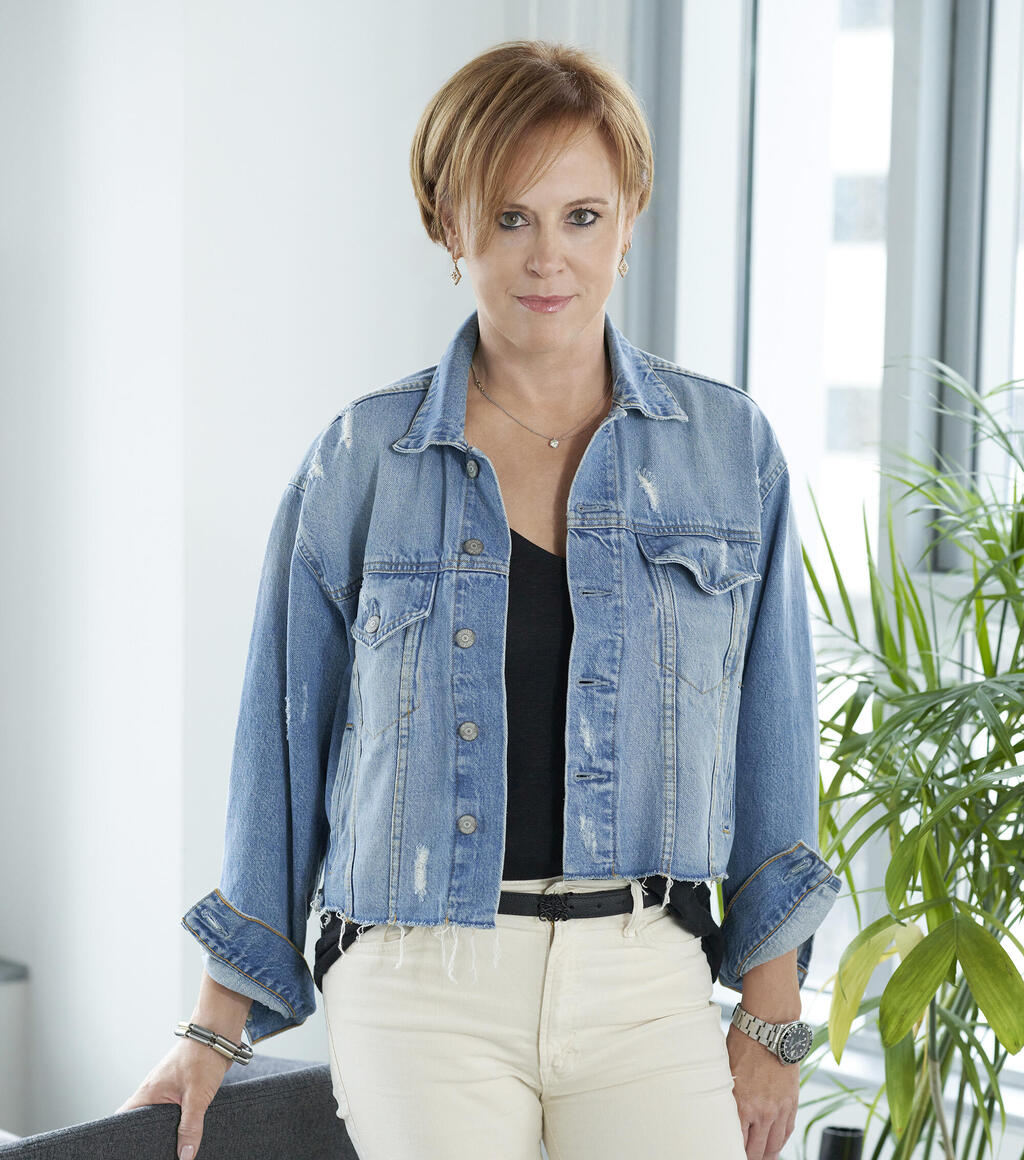
Interview
Russak-Aminoach embracing hi-tech life with fintech-on-steroids incubator
The former CEO of Bank Leumi discusses the 2014 cyber attack, the missed opportunity with Pepper, and the fintech projects she is leading in her new role at Team8
"Only one thing frightened me when I was CEO of Bank Leumi, and I ended up making lemonade out of that lemon." This is how, after two years and a quarter (but who's counting), Rakefet Russak-Aminoach summarizes her seven-year term at the bank, during which Leumi became the country’s largest bank. These seven years were turbulent. They included ending the bank's tax evasion affair in the United States, an aggressive plan to improve operational efficiency that entailed shutting down hundreds of branches and reducing human resources, creating a digital bank, and one unforgettable photo, over Diet-Coke, with Nochi Dankner that sparked the "Baim Lebankaim" (Going to Bankers) protest against her. However, looking back at all this did not really bother or intimidate Russak-Aminoach. It was something else.
"When I announced that I was leaving my position in 2019, and was asked what I wished for during my notice period, it was clear to me what was most important: no cyber incidents. This was also the thing that frightened me the most as CEO of Bank Leumi: a cyber attack," Russak-Aminoach tells Calcalist in her first in-depth interview since her career change.
Really? Not employee dissatisfaction with the streamlining process? A drop in share prices? Not even Barak Cohen who stalked your house until a restraining order was issued against him? Why cyber?
"In the banking world, the moment there's panic, the bank is finished. And what does a cyber attack create if not panic?"
It was the realization of her biggest fear that drove the bank's CEO from her ivory tower to her current role: Managing Partner at Team8, a venture group which builds and invests in fintech startups, alongside cybersecurity companies. The group was founded by Nadav Zafrir, former commander of the IDF’s Unit 8200. Few details about the 2014 cyber incident at Leumi were known until now, mainly due to the bank's desire to suppress the story. But now, almost a decade later, Russak-Aminoach reveals it was one of the defining moments of her life.
"October 30, 2014, we were celebrating former chairman of the bank David Brodet's 70th birthday, and we started to receive emails from a blackmailer who had stolen information. We didn't know yet that the breach only affected Leumi Card holders and not the whole bank. This was the beginning of a 16 day long downward spiral. The most senior authorities in the country were involved, including the Prime Minister, the Chief of the Police and others who can't be named. Eventually, all of the blackmailers were caught in Thailand and received lengthy prison sentences, so I suppose there was a good ending. But for me, these were by far the hardest 16 days of my career. When you’re in a situation like that, you don’t know exactly what information the blackmailer has. Maybe it's sensitive banking data that, if published, would require you to explain things to the media, even though you yourself don’t have the full picture. Very quickly we realized there was risk of a ‘bank run’ (an extreme event in which clients lose faith in the bank and hurry to withdraw their money, causing the bank to collapse – S.S.).
"Ego? I call it power"
As her (and any banker’s) worst fear unfolded, Russak-Aminoach received an introduction that led to a new career in hi-tech, one that allowed her to drop the pant-suits and return to relative anonymity. The attack at Leumi was also one of the factors that prompted the establishment of the Israel National Cyber Directorate as an independent body in 2015.
"During this event I realized I need assistance. My husband, who was the financial advisor to the Chief of the IDF had gotten to know Nadav just before the end of his term. We met on a Saturday morning. I explained the situation to Nadav and a group of people he had brought with him. These individuals eventually went on to establish the first cyber incident response team at Sygnia, a company that was founded within Team8 and later sold to the Singapore giant Temasek for $250 million. Now that I’m familiar with the correct terms, I can say that Bank Leumi was, in fact, actually a partner in designing and developing Sygnia’s solution. They were a brilliant group that knew how to respond to cyber incidents, but at the time they did not yet have a real product. Nadav and I stayed close friends and the rest is history," jokes Russak-Aminoach.
And here you are, in jeans and sneakers, wearing a jacket only for the photoshoot. To meet you I did not have to deposit my ID and pass through five different secretaries. Do you miss all the things that accompany being a bank CEO?
"I really enjoyed the bank and being CEO. Leaving was a rational decision, not an emotional one. I worked very hard to turn Leumi into the largest bank in Israel, in terms of market capitalization. But everything the position entailed – waking up each morning, suiting up, being recognized in the street – it was a burden for me."
How is life with all the egos in a rather small office building far away from Rothschild Boulevard in Tel Aviv? In addition to you and Zafrir there’s Yuval Tal and Ronen Assia, the founders of Payoneer and eToro – two successful unicorns. The names go on and on, isn't it too crowded?
"You call it ego, I call it power. Everyone brings something different to Team8. These are people who get up in the morning and all they care about is building companies. I am not a very political person. Managing here is exactly like managing Leumi – bringing order to the chaos."
And now you can make a lot more money, without having protesters outside your home.
"There are still protesters outside my house, because somehow I've turned into a symbol for them. But if I could restart my career, I would probably study computer science and become an entrepreneur. But when I left Leumi I was 53 and Nadav helped me realize that rather than building one company, I would be better off doing in fintech what he did in cyber – build multiple companies. So I raised $100 million to launch five companies – it's like a start-up on steroids."
But in fact you created a sort of start-up inside Leumi – the digital bank ‘Pepper’ in which you invested a lot, yet it’s difficult to say that it has fulfilled its vision. Only lately Hanan Friedman, your successor, decided to shut down the payments app ‘Pepper Pay’, which was a part of your ambitious project.
"The days 'Pepper' was written in my calendar were the days that excited me. But you can’t forget that Bank Leumi is a massive ship – it’s celebrating its 120th birthday now – and creating a cultural and technological revolution within an institution of that size takes years. Luckily, I wasn't a CEO that watches the share price, because investors don't understand the path, they only see the final outcome. I started with 14,000 employees and retired with 9,000. Out of 300 branches we ended up with fewer branches than Mizrahi-Tefahot and Discount Bank, and our value had tripled. But all of this took years; with start-ups everything moves much faster."
So ‘Pepper's’ obstacle is the slow pace of the banking system? It seems that despite Leumi's huge investment, estimated at half a billion NIS, ‘Pepper’ has fewer than 500,000 clients and isn’t growing.
"It's exactly what I thought it would be. In terms of customers, ‘Pepper’ is bigger today than Bank Igud. It onboarded Leumi's customers; they used to give 1,800 or 3,000 NIS for opening an account with them and today the customer acquisition process is simply different. True, it caused cannibalization within Leumi, but in the end, we saw that it matched the bank's market share and nothing more. Amiram Sivan (the legendary CEO of Bank HaPoalim in the 90's – S.S.) made a major move when Bank Hapoalim joined the Histadrut. This transformed Hapoalim into the bank for salaried employees in Israel. ‘Pepper’ is the 20 year belated response to that move. Regarding payment apps like Pepper Pay and others, they’re a nice product without a business model that costs banks a lot of money. There's a limit to how much one can pay for an image."
Everything you’re saying isn't particularly good news for One Zero digital bank, which recently started operating in Israel. Is its existence justified in the local market?
"Digital banks are based on a large mass of customers in order to generate revenue, so it's not a trivial decision to open a digital bank in Israel.
“Despite the fact that Israel is one of the world's largest producers of fintech companies, with many success stories that attest to its fantastic reputation in the field, our limited market size is the primary reason that Israeli citizens do not get to benefit from all of its innovations. The local financial services ecosystem is not nearly as advanced as the rest of the world because the fintech start-ups born here are focused on international markets from the start.”
In your position at Team8 these days you are already building a third fintech company, even though in the end none of them will operate here. Isn't that frustrating?
"Israeli regulation isn't unusual in the world, but adapting products to comply with local regulation requires financial resources that are hard to justify given the size of the total addressable market."
Were we destined to be left behind in fintech?
"For fintechs to be incentivized to walk through the Via Dolorosa, local regulators need to make concessions. As long as things are the way they are in large countries, it won’t pay to set up operations here."
So how do you explain that the field is flourishing in Israel?
"Not everything that happens has an explanation. It's like when all the banks had female CEOs. Now only Smadar Barber-Tsadik at Benleumi is left, and the rest are men – it happens without any special reason."
"We don't wait for someone to bring us an idea"
Last January, Team8 launched Spott, the first company founded by Russak-Aminoach together with Payoneer’s Yuval Tal. The company develops a digital insurance platform for online sellers directed specifically at Amazon vendors, and has already raised $8.3 million in seed money. Russak-Aminoach's second company is April, which launched in the United States in order to ease the cumbersome tax filing process with which Americans must contend. She is currently working on establishing a third company.
How exactly do your work methods differ from a regular venture-capital fund that considers a large number of startups before deciding which ones to invest in?
"We don’t wait for someone to bring us an idea. For the first two companies we built, the ideas were born here and then we found the entrepreneurs who would lead them. Team8 is not just an investor, but a founding partner as well. Our average investment in seed rounds ranges between $5M to $8M. It’s true that in the public market the valuations have decreased, but in the private market it takes time because there's a gap of a few months. Although there is still plenty of money available and limited options, it will happen: when the shake-up comes, everybody will be tighter with their money."
The foreign markets may be large, yet most fintech and insurtech companies can’t turn a profit because the customer acquisition cost is enormous; you can see it in ‘Pepper's’ case and in the case of Israeli insurtech companies that already went public like Hippo and Lemonade.
"Right. The new banks are worth billions today but over the years they lose money because they have difficulty finding a sustainable business model. This is because finances are like health: trust and conservatism are critical. I always say that it's no coincidence that in Hebrew the word for 'money' (as in the term for Hannukah gelt) and the word for 'blood' derive from the same root. But there's a solution to this, and that's how I build my companies: a combined model of traditional institutions and fintech companies. The question of whether to adopt a B2C model, meaning selling direct to the end user, or a B2B model, selling to another company, isn’t relevant because the model is B2B2C. Fintechs need to connect with large traditional institutions and reach end users through them. This is how the world will look in the future, a completely new order."
Is this the model you are leading in your Team8 companies?
"Yes. For example with ‘April’ which developed an automated tax filing process for U.S. taxpayers. We aren’t directly targeting Ms. Cohen from Nebraska. Rather, we’re partnering with banks which have a button in their app that directs the customer to us.”
So in fact, when you look back at ‘Pepper’, would you have preferred to acquire it as an app from an outside source?
"Sure. The problem was that the technology didn’t exist then. There were maybe ten digital banks, while today there are 300."
What do you understand today about technology that you didn’t understand when you were at the bank?
"I didn’t understand the concept of embedded (integrated) solutions well enough, but it wouldn’t have helped me much because such options weren’t available back then. Selling to the end user is a long and expensive process. On the other hand, banks and traditional insurance companies won’t be able to grow without embracing fintech. Until recently they were constrained by costs, regulation, real estate investments, computing investments - today it's all gone. But the vast majority of customers are still there. In general, finance is not a stand alone industry, but something that exists within every sector – in cyber, health, the automotive industry – and this is why you should provide financial solutions to where the client already is, and not try to bring them to you."
Throughout her career, Russak-Aminoach made many unconventional decisions that turned out to be correct. One of these was when Russak-Aminoach surprised the financial industry when she decided that the bank would pay $400M in order to close the U.S. Internal Revenue Service’s investigation into aiding and abetting tax evasion by U.S. citizens. Looking back, this turned out to be the right move; Bank Hapoalim had to pay more than twice this amount six years later.
Her transition from banking to hi-tech has surprised many colleagues, but Russak-Aminoach's success in her new role is not yet measurable; she only recently started working at her fintech-on-steroids incubator. To her benefit, she has extensive experience and a deep understanding of the field, as well as a thriving market. Despite the focus on cyber, real money, as usual, is in finance. In 2021 fintech companies raised $140 billion, triple the amount from 2020. Relative to other sectors, fintech is also the leader when it comes to large investment rounds ($100M+), with more than 400 fintech companies completing rounds of this size. By comparison, cyber start-ups raised "only" $30 billion. However, it's hard to say that Team8’s model – building cyber companies since 2013, a time frame comparable to any other venture capital fund – has had unprecedented success. After selling Sygnia to Temasek, last year Curv was sold to PayPal for $200M and Claroty achieved unicorn status when it acquired Israeli Medigate for $400M. If Russak-Aminoach wants to match the success she enjoyed at Bank Leumi in her new career, she will need to produce more exciting exits for her fintech companies.














